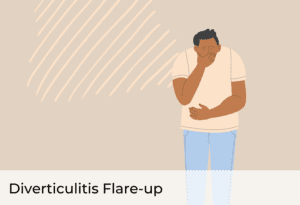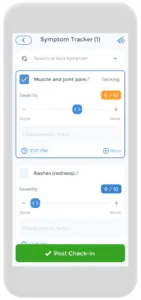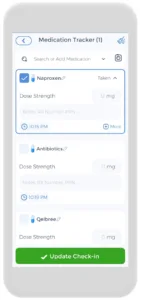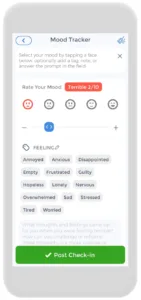
Are you experiencing pain and discomfort in your lower abdomen? How about bloating, fever, and changes in bowel movements? If so, you may be dealing with diverticulitis and its dreaded flare ups. This common condition affects millions of people around the world, especially those. But what exactly is diverticulitis, and what causes it to flare up? And most importantly, what can you do to manage and prevent this condition from interfering with your daily life?
In this article, we will dive deep into the world of diverticulitis and its flare ups, exploring the underlying causes, symptoms, and potential complications. We will also discuss the various treatment options available, from dietary modifications and medication to surgery. Whether you’re a long-time sufferer of diverticulitis or simply want to learn more about this condition, this article is for you. So, let’s explore the world of diverticulitis and its pesky flare ups together.[1][2]
Diverticulitis: Understanding the Basics
Diverticulitis is a condition that occurs when small pouches called diverticula, which form in the lining of the colon or large intestine, become inflamed or infected. These pouches are common in people over the age of 40 and are usually harmless. However, when they become infected or inflamed, they can cause a range of symptoms and complications.
How does diverticulitis develop?
Diverticula are small bulging pouches that develop in the lining of the colon or large intestine. They are common in people over the age of 40 and are usually asymptomatic. Diverticula form when weak spots in the large intestine or colon wall or lining bulge outward, creating small pouches. As you are, this is something that normally just happens. However, these pouches can become infected when fecal matter and bacteria get trapped in them. This infection leads to inflammation, which can cause symptoms such as pain, fever, and changes in bowel habits.
Certain factors can increase the risk of developing diverticulitis. A low-fiber diet is one of the main risk factors, since it can lead to constipation and difficulty passing stool, which increases the pressure in the colon. Obesity is also a risk factor, as excess weight can put pressure on the colon. Aging is another risk factor, as the walls of the colon may weaken over time. Finally, certain medications that affect the muscles of the colon, such as opioids, can also increase the risk of developing diverticulitis.
While certain risk factors are avoidable, lifestyle factors are something that you can control. Lifestyle is often something that is overlooked in many medical conditions. However, living a healthy lifestyle is one of the best ways you can prevent diseases. In this case, consuming a high fiber diet and exercising regularly can decrease your risk of diverticulitis.
What does diverticulitis do to the body?
The inflammation and infection caused by diverticulitis can lead to a variety of symptoms and complications that can range from mild to severe. The most common symptom of diverticulitis is abdominal pain, which can be constant or intermittent and usually occurs in the lower left side of the abdomen, where the sigmoid colon is. The pain may be accompanied by fever, chills, and a general feeling of illness.
complications that can range from mild to severe. The most common symptom of diverticulitis is abdominal pain, which can be constant or intermittent and usually occurs in the lower left side of the abdomen, where the sigmoid colon is. The pain may be accompanied by fever, chills, and a general feeling of illness.
Mild Cases
Diverticulitis symptoms may be limited to mild symptoms like abdominal pain and discomfort, along with constipation or diarrhea. However, in more severe cases, diverticulitis can lead to serious complications such as abscesses. These are pockets of pus that form in the wall of the colon. These abscesses can cause intense pain, fever, and even sepsis if left untreated.
In some cases, diverticulitis can also lead to the formation of fistulas, which are abnormal connections between different parts of the intestine or between the large intestine itself and other organs. These fistulas can cause chronic pain, infection, and other complications.
Rare cases
Diverticulitis can also lead to intestinal and digestive tract blockages, which can cause severe abdominal pain, nausea, and vomiting. Perforation, another rare but serious complication, occurs when the diverticula burst and release fecal matter into the abdominal cavity, causing a potentially life-threatening infection called peritonitis. Peritonitis is a medical emergency and can be fatal if left untreated.
What are some symptoms of diverticulitis?
The symptoms of diverticulitis can vary from person to person. For some people, they may not experience any symptoms at all. For others, it can cause life-threatening conditions. The most common symptoms of diverticulitis include:
- Abdominal pain and tenderness: The most common symptom of diverticulitis is abdominal pain and tenderness, which is typically felt on the left side of the lower abdomen. The pain may be constant or intermittent, and it can range from mild to severe sharp pain. The pain may also get worse with movement or pressure.
- Fever and chills: Many people with diverticulitis experience a fever and chills, which are signs of infection. The fever may be low-grade or high, depending on the severity of the infection.
- Nausea and vomiting: Some people with diverticulitis experience nausea and vomiting, which can be caused by inflammation or infection in the colon.
- Constipation or diarrhea: Diverticulitis can cause changes in bowel movements, such as constipation or diarrhea. Constipation is more common in people with mild diverticulitis, while diarrhea is more common in people with severe diverticulitis.
- Bloating and gas: Diverticulitis can cause bloating and gas, which can be uncomfortable and embarrassing. These symptoms are caused by inflammation in the colon and changes in bowel movements.
It’s important to note that some people with diverticulitis may not experience any symptoms at all and that there are also other symptoms. However, if you experience any of the above symptoms, it’s important to see a doctor as soon as possible to receive a proper diagnosis and treatment. Also, keep in mind that many of these symptoms are not exclusive to diverticulitis. Just because you experience these symptoms does not mean that you have diverticulitis. This is why you should speak to a healthcare professional to rule out any other potential conditions you may have, and receive the most accurate diagnosis.
How do we diagnose diverticulitis?
Diagnosing diverticular disease is done through a combination of medical history, physical examination, and diagnostic tests. Your doctor may perform a physical exam to check for abdominal tenderness and inflammation. Diagnostic tests may include blood tests, a stool test, and imaging tests like abdominal X-ray or CT scan.
How do we treat diverticulitis?
 Treatment for diverticulitis depends on the severity of the condition. Mild cases of diverticulitis can be treated with antibiotics, rest, and a clear liquid diet. More severe cases may require hospitalization, intravenous antibiotics, and bowel rest. Surgery may be necessary in cases of severe or recurrent diverticulitis or if complications such as abscesses or fistulas develop.
Treatment for diverticulitis depends on the severity of the condition. Mild cases of diverticulitis can be treated with antibiotics, rest, and a clear liquid diet. More severe cases may require hospitalization, intravenous antibiotics, and bowel rest. Surgery may be necessary in cases of severe or recurrent diverticulitis or if complications such as abscesses or fistulas develop.
In addition to medical treatment, lifestyle changes such as increasing fibre intake, drinking plenty of fluids, and exercising regularly can help prevent diverticulitis flare-ups and promote digestive health.
Diverticulitis flare ups: Complicated diverticulitis
Diverticulitis flare ups refer to the sudden and severe worsening of symptoms associated with diverticulitis. During a diverticulitis flare up, the inflammation and infection in the diverticula can become more severe, leading to intense pain, discomfort, and other complications.
What does a diverticulitis attack feel like?
During a diverticulitis flare up, the symptoms are often more severe than in cases of uncomplicated diverticulitis. The abdominal pain and discomfort may be continuous and more intense, often localized to the lower left side of the abdomen. The pain may worsen when the affected area is touched, and other symptoms can also radiate to other parts of the body, such as the lower back or groin.
Along with pain, bloating is another common symptom during a flare up. Bloating can cause discomfort and a feeling of fullness in the abdomen, as well as increased flatulence. During a flare up, the digestive system may also be affected, resulting in changes in bowel movements. Some people may experience diarrhea, while others may have constipation.
Why does complicated diverticulitis occur?
During a diverticulitis flare up, the diverticula, which are already weakened outpouchings of the colon or abdominal wall, can become inflamed or infected and irritated. This inflammation can cause pressure on the walls of the diverticula, leading to pain and discomfort. Inflammation can also damage the walls of the diverticula, leading to small tears or perforations, which can allow bacteria and fecal matter to leak into the abdominal cavity. This can cause abscesses, fistulas, or other complications, which may require medical intervention.
As mentioned earlier, a low-fiber diet is a significant risk factor for diverticulitis and more severe symptoms. A diet low in fiber can lead to constipation, which can cause increased pressure in the colon and weaken the walls of the diverticula.
Constipation can also cause food to move more slowly through the colon, giving bacteria more time to ferment the undigested food and produce gas, leading to bloating and discomfort. Aging is also a risk factor as the walls of the colon can weaken over time.
Additionally, certain medications, such as drugs that promote inflammation, can increase the risk of a diverticulitis flare up. They do so by irritating the colon and promoting inflammation. As you know already, diverticulitis is caused by inflammation, so increasing the amount of inflammation will only exacerbate things. If such drugs are something you need to take for other conditions, consider speaking to your healthcare provider to see if there are alternative options. Stress and lack of exercise can also increase the likelihood of a flare up. It is essential to identify and manage these risk factors to prevent diverticulitis flare ups.
How to prevent them?
Here are some ways to prevent diverticulitis flare ups:
- Eat a high fibre diet: Consuming a diet rich in fiber can help prevent constipation, which can aggravate diverticulitis. Fiber adds bulk to stool, making it easier to pass through the colon. Good sources of fiber include fresh fruits, vegetables, whole grains, and legumes.
- Drink plenty of water: Staying hydrated can help soften stool and prevent constipation, which can lead to diverticulitis flare ups. Obviously, try to drink as much water as you can, but aim for atleast eight glasses of water a day.
- Avoid foods that irritate the digestive system: Certain foods can irritate the digestive system and trigger diverticulitis flare ups. These foods can vary from person to person, but common culprits include spicy foods, caffeine, alcohol, and processed foods. Understandably, it may be difficult to avoid certain foods, so having your own coping mechanisms could be very useful.
- Manage stress: Stress can contribute to digestive issues, including diverticulitis flare ups. Managing stress through relaxation techniques like meditation, yoga, or deep breathing exercises can help reduce the risk of flare ups.
- Get regular exercise: Regular physical activity can help keep the digestive system functioning properly and prevent constipation. Aim for at least 30 minutes of moderate exercise most days of
 the week.
the week.
By making these lifestyle and dietary changes, and managing risk factors, individuals with diverticulitis can help prevent flare ups and maintain good digestive health.
How they are managed?
The management of diverticulitis flare ups depends on the severity of symptoms and the extent of complications.
- Mild cases of diverticulitis can often be managed at home with pain relievers, such as acetaminophen or ibuprofen, rest, and dietary modifications. During a flare up, it’s important to stick to a clear liquid diet for a few days until symptoms improve. Once symptoms improve, a low-fiber diet may be gradually reintroduced, followed by high-fiber foods to prevent future flare ups.
- In more severe cases, hospitalization may be necessary for intravenous antibiotics, bowel rest, and close monitoring. Surgery from rectal surgeons may be required if complications, such as bowel perforation, fistulas, or intestinal blockages, occur.
- In addition to medical treatments, lifestyle modifications can also help manage diverticulitis flare ups. This includes avoiding foods that may irritate the digestive system, such as spicy foods, caffeine, and alcohol. Managing stress and getting regular exercise can also help reduce the risk of flare ups.
It’s important to note that untreated or poorly managed diverticulitis flare ups can lead to complications that can be life-threatening. If symptoms worsen or new symptoms develop, such as severe abdominal pain, high fever, or rectal bleeding, seek immediate medical attention.
When they can become dangerous?
In addition to the immediate possible complications mentioned earlier, diverticulitis increases the risk of developing other health conditions in the long run. For example, studies have shown that individuals with diverticulitis have an increased risk of developing colorectal cancer compared to those without the condition. The chronic inflammation caused by diverticulitis may contribute to the development of cancerous cells in the colon.
Furthermore, repeated episodes of diverticulitis can damage the colon and increase the risk of other digestive conditions such as irritable bowel syndrome (IBS) or inflammatory bowel disease (IBD). These digestive conditions can cause chronic diarrhea, abdominal pain, and other complications that can negatively impact a person’s quality of life.
In some rare cases, diverticulitis can also affect the kidneys. When the colon is inflamed or infected, it may put pressure on the nearby ureter, which is the tube that connects the kidney to the bladder. This pressure can lead to a blockage, causing urine to flow back into the kidney and potentially leading to kidney damage or infection.
Therefore, it is important for individuals with diverticulitis to receive prompt and appropriate treatment to prevent these potential complications and kidney diseases from occurring. Regular check-ups with a healthcare provider and following a healthy lifestyle can also help reduce the risk of developing other digestive and kidney diseases.
Using an App to Help Manage Diverticular Disease
Having a diverticular disease plan is crucial, and the CareClinic app can help with that. You can use the app as your journal. Just go to the diary section of the app and enter your daily symptoms, medications, and triggers as they occur. There are also specific sections on the app to track each of these. Next time you visit the doctor, this information will be handy in your pocket.
The app also has a medication section where you can precisely track the doses you are taking and receive reminders on when to take each medication. We know how difficult but important keeping track of your medications is, so we hope to make it as easy and streamlined as possible.
In conclusion, diverticulitis is a common condition that can cause a range of symptoms and complications, especially during flare ups. It is important to recognize the symptoms of diverticulitis and seek prompt medical attention if you experience any flare ups. Making lifestyle changes such as increasing fiber intake, managing stress, and getting regular exercise can also help prevent flare ups and manage symptoms. With proper diagnosis, treatment, and management, most people with diverticulitis can lead normal, healthy lives.
Sources:
- Mayo Clinic. (2021). Diverticulitis. Retrieved from https://www.mayoclinic.org/diseases-conditions/diverticulitis/symptoms-causes/syc-20371758
- National Institute of Diabetes and Digestive and Kidney Diseases. (2020). Diverticulosis and diverticulitis. Retrieved from https://www.niddk.nih.gov/health-information/digestive-diseases/diverticulosis-diverticulitis
- Centers for Disease Control and Prevention. (2021). Colorectal Cancer. Retrieved from https://www.cdc.gov/cancer/colorectal/index.htm
- National Institute of Diabetes and Digestive and Kidney Diseases. (2023). Diverticulitis. Retrieved from https://www.kidney.org/atoz/content/diverticulitis
References
- “Diverticulitis: Symptoms, Causes & Treatment”. https://my.clevelandclinic.org/health/diseases/10352-diverticulitis
- “Treatment for Diverticular Disease – NIDDK”. https://www.niddk.nih.gov/health-information/digestive-diseases/diverticulosis-diverticulitis/treatment/
- “Foods for Diverticulosis and Diverticulitis | Johns Hopkins Medicine”. https://www.hopkinsmedicine.org/health/wellness-and-prevention/foods-for-diverticulosis-and-diverticulitis/
- “Lifestyle Changes for Diverticular Disease | NYU Langone Health”. https://nyulangone.org/conditions/diverticular-disease/treatments/lifestyle-changes-for-diverticular-disease


 the week.
the week.